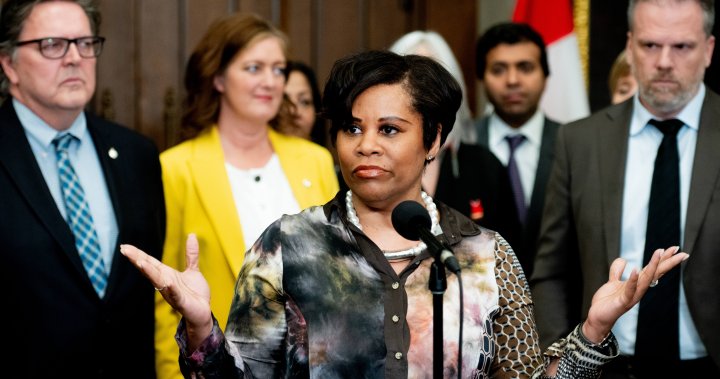As an annual anti-abortion rally prepares to gather on Parliament Hill, Liberal and Conservatives have been trading political barbs over whether abortion access could face attempts to curtail it.
It comes as the fall of Roe v. Wade in the United States has put the issue front and centre ahead of November’s presidential election.
Minister for Women and Gender Equality and Youth Marci Ien on Wednesday suggested Conservative Leader Pierre Poilievre could use the notwithstanding clause to remove abortion rights in Canada, citing his vow to use the controversial clause for bail reform.
“Are we fear mongering? Unequivocally, no. It wasn’t too long ago in this country that abortion was a crime. So it is not, too much to say that this is the slope we could be going down,” she said Wednesday.
A statement from Poilievre spokesperson Sebastian Skamski in response to Ien’s comments said a Conservative government would not use the notwithstanding clause on abortion.
“This outlandish claims show the true desperation of Justin Trudeau and his flailing Liberals. A common sense Conservative government will not legislate on abortion and therefore would never use this section of the Constitution pertaining to this matter,” Skamski wrote.
A Conservative government “will only use the notwithstanding clause on matters of criminal justice,” Skamski added.
Prime Minister Justin Trudeau had made similar comments to Ien in question period.
“It is clear [Poilievre]’s not going to protect a woman’s right to abortion. He boasted about using the notwithstanding clause to trample on the rights of Canadians and a women’s right to choose should not be debated in 2024, but because of him it has come up,” Trudeau said in French.
This follows a petition tabled by Alberta Conservative MP Arnold Viersen on Monday, calling for the government to regulate abortion. He’s tabled three similarly worded petitions since November.
The Liberals have floated the prospect of a Conservative government rolling back abortion rights during the last two election campaigns, both against Andrew Scheer in 2019 and Erin O’Toole in 2021.
In the 2022 Conservative leadership campaign, Poilievre said a government he led “would not introduce or pass legislation restricting abortion” during the first debate.
The renewed political criticisms came after a Conservative MP earlier in the week put forward a petition that calls on the government to “create/strengthen abortion regulation nationwide.”
But could the notwithstanding clause even be used if any future government wanted to restrict abortion?
What does the notwithstanding clause do?
Breaking news from Canada and around the world
sent to your email, as it happens.
The Supreme Court of Canada ruled Criminal Code provisions against abortion were unconstitutional in the 1988 R v Morgentaler case.
University of Ottawa Law professor Daphne Gilbert says that the notwithstanding clause could theoretically be used to restrict abortion, but it would require legislation to recriminalize the procedure first.
“That was what Morgentaler struck down in 1988. It struck down the Criminal Code provision that regulated how abortions had to be provided. And since then, we’ve had no criminal law with respect to abortion. And so it would be to re-criminalize abortion and then use the notwithstanding clause to shield any constitutional challenge against that law,” Gilbert explained.

At the most recent Conservative policy conference in Quebec City last summer, party members adopted a non-binding resolution that a Tory government would not support legislation to regulate abortion.
However, there is wording in the policy document to allow free votes from party members on issues of “moral conscious” including abortion.
The notwithstanding clause is a provision in Charter of Rights and Freedoms, Section 33, that allows the federal or provincial governments to override certain sections of the Charter and enact legislation notwithstanding the provisions of the constitution.
It allows legislation that would violate certain sections of the Charter, including legal rights and equality rights, to be effectively overridden for a period of no more than five years, before the invocation of the clause sunsets.
The notwithstanding clause cannot be used to override the right to vote, language rights, mobility rights or the sections on the sitting of the House of Commons or provincial legislatures.
For it to be used on something like abortion, University of Ottawa law professor Daphne Gilbert says a government would have to first introduce legislation to re-criminalize it.
“[The Supreme Court] struck down the Criminal Code provision that regulated how abortions had to be provided. And since then, we’ve had no criminal law with respect to abortion. And so it would be to re-criminalize abortion and then use the notwithstanding clause to shield any constitutional challenge against that law.
Where is this idea coming from?
The question of how a federal government could use the notwithstanding clause has been in the spotlight since Poilievre’s speech to the Canadian Police Association on bail reform, though he did not overtly mention the notwithstanding clause.
On criminal justice reforms, Poilievre said he would use “whatever tools the constitution allows me to use to make them constitutional. I think you know exactly what I mean.”
In a written response after the CPA speech, Skamski confirmed Poilievre was referring to using the notwithstanding clause.
Three days later, in a May 2 interview with Global News, Poilievre said he wouldn’t have to use the notwithstanding clause because he would repeal the 2018 legislation the Trudeau government passed to modernize the bail system after provisions in the previous law were found to be unconstitutional.
“I don’t have to because the catch and release system was not brought in by the courts. It was brought in by Justin Trudeau and the NDP through Bill C-75, and it was not required. Nobody, no court has ever required they create a catch and release bail system,” Poilievre said in that interview.
“I think we have to be careful not to blame the judges for decisions that Justin Trudeau and the NDP have made.”
Gilbert says the nothwithstanding clause has never been used in a criminal justice matter before, let alone by the federal government.
She says that once that happens, no one can predict how the clause may be used in the future.
“We could see a constitutional crisis. We could see the government trying to overturn a series of Supreme Court decisions in all areas in criminal law, including evidentiary decisions or sentencing decisions. That’s the one that that, probably is particularly aggrieved by is the Supreme Court decision that prohibits the stacking of parole eligibility,” Gilbert said.
“Once you start down that road, there’s nothing that is sacred then. The Charter is is gutted of meaning because you can both overturn settled decisions and you can shield any future decisions by just invoking the clause preemptively, which we’re seeing around the country happening more and more.”
With files from Global News’ Richard Zussman.



